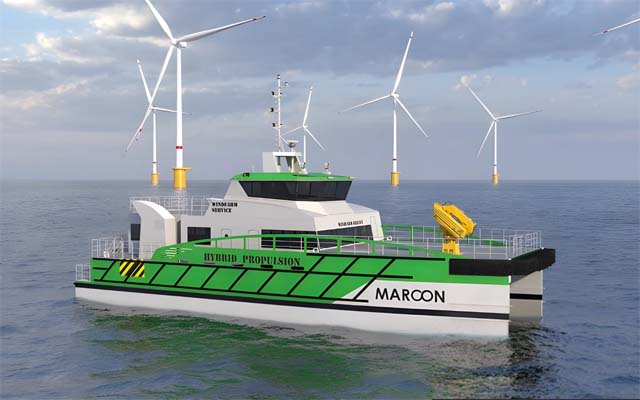KR (Korean Register) has granted Approval in Principle (AIP) for a Crew Transfer Vessel (CTV), a passenger and cargo transport vessel dedicated to offshore wind farms, developed by Korean maritime service company Marcon.
CTVs are widely used in Europe for transporting workers and equipment necessary for offshore wind farm construction and maintenance. Those that use diesel engines have raised concerns about emissions. The AiP for Marcon recognises that the CTV adopts an eco-friendly hybrid electric propulsion system using batteries. This addresses environmental regulatory issues while offering fuel cost savings and supporting safer offshore wind farm operations. The key components of this CTV include a hybrid system and energy storage system (ESS) provided by Hanwha Aerospace, Linear Jet propulsion units and hybrid CTV power conversion devices, integrated PEMS (power and energy management system), and generators supplied by YusinHR.
The immersion-type ESS supplied by Hanwha Aerospace is a lithium-ion battery with an insulation fluid immersion method, which enhances insulation strength, improves cooling effects, prevents thermal runaway transfer, and ensures safety against fire with a smothering extinguishing function.
The Linear Jet provided by YusinHR is an eco-friendly propulsion system with a high efficiency of up to 70%, capable of reaching a maximum speed of 25 knots. Its introduction is expected to bring positive changes to the Korean propulsion system market.
According to Marcon, the electric hybrid CTV is expected to reduce operating time by about 34% and decrease CO2 emissions by approximately 70% compared to traditional internal combustion engine propulsion systems.
During this CTV project, KR verified the design safety and compliance of the CTV by reviewing domestic and international regulations.
KiM Daeheon, EVP KR R&D Division, said: “It is very meaningful to be part of the first application of an eco-friendly hybrid electric propulsion system for a CTV, and we will continue to provide technical support throughout the vessel’s construction and future launch.”
The construction of the first vessel began at a Korean shipyard in September 2024, with its launch scheduled for 2025.
Image: Rendering of Marcon hybrid CTV (source: Korean Register/Navigate PR)



